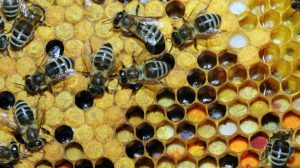17

Bee Pollen
Bee pollen is a ball of pollen (male seed of a flower) that is collected and packed into cells by worker bees, which are always female. When a worker bee lands on a flower, she scrapes the pollen off of it with her legs and jaw and presses it into a pollen basket.
The pollen basket is actually a part of the bee located on her hind legs. When the basket is full, it contains a single granule that is transported back to the hive and packed into a honeycomb cell with a bit of honey so it won’t spoil.
The chemical composition of bee pollen is always different depending on whatever plants and flowers the pollen was collected from. One teaspoon of bee pollen contains over 2.5 billion grains of flower pollen, and takes one bee an entire month working eight hour days to collect.
Bee pollen, along with other bee products like honey, propolis, and royal jelly, have been consumed for centuries, dating back to 2735 BC and perhaps beyond. There is mention of bee products in the texts of ancient Rome and Greece, and in books like the Bible, Torah, and Koran.
It has been said that bee pollen is the most nutritionally complete food found in nature, as it contains all the essential nutrients capable of sustaining life all by itself.
Bee Pollen Benefits
Bee pollen contains an abundance of enzymes, which play an important role in everything from cellular health to digestion. Bee pollen is rich in antioxidants that protect our cells from oxidation. Bee pollen also contains more protein by weight than any animal source, making it ideal for vegetarians. And bee pollen is a strong anti-inflammatory.
Inflammation is extremely detrimental to the human body, as it provides a kind of foundation on which disease can build. It has even been hypothesized that without inflammation there can be no disease. Bee pollen has been effective in treating benign prostate hyperplasia, also known as enlarged prostate, which is just one symptom of inflammation.
Bee pollen is also a powerful antibacterial, antimicrobial, and antiviral, which means it helps prevent infectious diseases like the common cold and flu, to more serious conditions. Bee pollen benefits are numerous and include …
- Increasing energy levels
- Treating allergies
- Improving lung health
- Aiding digestion
- Boosting immune function
- Improving cardiovascular health
- Increasing strength and vitality
- Normalizing cholesterol levels
- Improving prostate health
- Increasing endurance
- Promoting longevity
- Improving skin complexion
- Reducing food cravings
- Normalizing weight
Bee pollen aids weight loss by stimulating the metabolic process. Bee pollen is also a low calorie food, as two tablespoons contain just 90 calories. And it contains phenylalanine, an amino acid that acts as an appetite suppressant.[90] According to the National Center for Biotechnology Information, Phenylalanine is also effective at treating ADHD, as it improves mental alertness. And it helps treat depression by normalizing levels of both norepinephrine and dopamine.
By the way, phenylalanine is just one of 22 amino acids found in bee pollen, which also includes all 9 essential amino acids necessary to sustain human life.
Bee pollen contains high amounts of rutin, a bioflavonoid that helps strengthen capillaries and blood vessels, improves circulation, reduces arterial clotting, and normalizes cholesterol.[91]
Bee pollen seems equally adept at treating cancer, as this 2007 study demonstrated. A bee pollen extract induced cytotoxicity in prostate cancer cells, and was shown to be a “promising candidate for the treatment of advanced prostate cancer.”[92] A more recent study also concluded that bee pollen contained polysaccharides that exhibited anti-tumor activity.[93]
A 2015 clinical study on the chemical composition and therapeutic applications of bee pollen discovered that it was a powerful antifungal, antimicrobial, antiviral, anti-inflammatory, anti-cancer, antibiotic, analgesic, along with containing numerous antioxidants and immunostimulating properties.[94] All of which improve immune function, combat cancer and other diseases, improve brain function, and increase longevity.
Sadly, there haven’t been that many studies done on bee pollen. Could it be due to the fact that it cannot be synthesized in a laboratory? Or could it be because it’s difficult to make a drug out of something so complex and still not completely understood?
Bee Pollen Uses
Bee pollen is extremely versatile and can be sprinkled on foods, used as an ingredient in recipes, or even eaten by itself. You can use it as a topping for yogurt, oatmeal, salads, homemade ice cream, cottage cheese. and other similar foods. Or you can add it to smoothies for an extra energy kick, which is my preference.
You can also use bee pollen as an ingredient in raw desserts, like homemade fudge and energy bars. For more ideas, check out this Pinterest page on bee pollen recipes. The photos are mouth-watering good.
Keep in mind that to preserve the incredible nutrients in bee pollen, you’ll want to avoid cooking or heating it, much like other superfoods. But you’ll have no trouble finding raw ways to use it.
You may be able to find bee pollen locally. However, if you’re like me, and living in the middle of nowhere, check out YS Eco Bee Farms Bee Pollen from iHerb. They also have a royal jelly product that I take every morning for a nice energy boost. The royal jelly I consume also contains bee pollen, propolis, ginseng, and eleuthero, all of which are powerful superfoods. Both the bee pollen and royal jelly are very reasonably priced, which isn’t always the case with superfoods.
